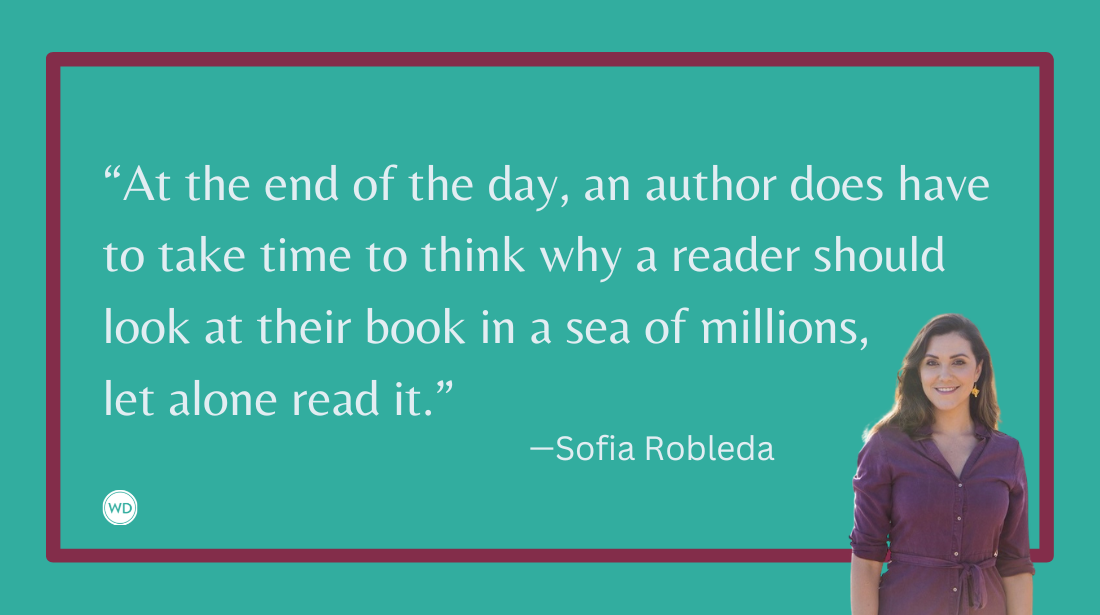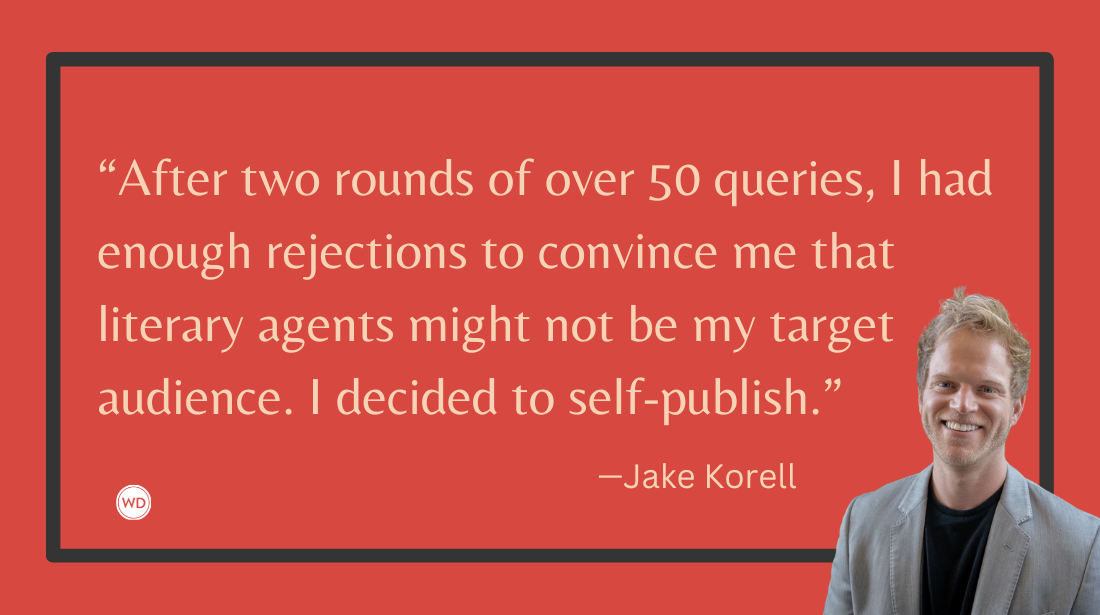How I Turned My Gruff, No-Nonsense Character Into My Best Marketing Tool (And How Any Author Can Do the Same—No Coding Required)
Author Andrew Bridgeman shares how he turned one of his characters into his best marketing tool—and how other authors can do the same.
We all face the same author marketing nightmare. How do you grow your newsletter without being pushy? How do you sell your work without sounding like a carnival barker? How do you make your book stand out in an ocean of literature?
I'm 60 years old with zero coding experience, but I stumbled onto a technological solution that's been working well for me. Instead of me pitching my books, one of my fictional characters does it—naturally, authentically, and with a personality that keeps readers engaged.
Here's how it happened, why it works, and how any author can set this up in a weekend.
The $100 Wake-Up Call
Like most authors, I've always been intimidated by website technology. When someone quoted me $100 to change an image on my site, I had a realization: If I can write a book, I'm smart enough to change an image in Squarespace. (Also, I'm cheap.)
Two weeks later, with the help of ChatGPT, I had completely rebuilt my website from scratch. I no longer owned a basic domain—I created a state-of-the-art platform. It was now engineered for AI search discovery, complete with schema, code injections, and widgets for social media and book reviews. The project cost me nothing, versus the $5,000 I would have spent to hire it out. And honestly? The learning curve wasn't as steep as you might expect.
But the real breakthrough wasn't technical—it was creative.
Enter Uncle Gunny
Thomas "Uncle Gunny" Barnett is the gruff, no-nonsense military-veteran sidekick from my thriller series. He's got a razor-sharp wit and zero patience for small talk. In my books, he's the character with the most distinctive voice.
So I put him to work.
Now, when visitors land on my website, they can chat directly with Gunny. They ask about my books, and he responds in perfect character—complete with his signature one-liners and military-style directness. I still have traditional FAQ and "About the Author" pages, but Gunny has become the more popular way for visitors to get information—especially for people who haven't read the books yet. Instead of scanning static content, they get to interact with someone from the fictional universe itself.
Here's what I mean. When a visitor asks "What do you do around here?" Gunny responds: "I keep the peace, buttercup. Answer questions about Emma Noble and the books. Make sure you don't get lost. And I get cigars if you subscribe to the newsletter. Keeps me busy."
How This Idea Evolved (And Why It Works)
Let's just say I have a 'curiosity' problem. I was researching what I needed to include on my website to be more discoverable by AI search engines. Apparently, a virtual assistant helps with that. But what's the point of having a generic AI bot on an author's website when you've only written two novels? That's when I realized the perfect virtual assistant was already sitting in the pages of my own book: Uncle Gunny could handle the job with personality to spare.
When he recommends my newsletter, it doesn't feel like marketing. It feels like advice from a friend—albeit a friend who doesn't sugarcoat anything and calls you "buttercup."
This approach seems to solve three fundamental author marketing problems:
The authenticity problem: Instead of me awkwardly promoting my own work, a character does it naturally as part of their personality.
The engagement problem: Readers can ask follow-up questions, explore character backstories, and dive deeper into the fictional world between books.
The soft-sell problem: Newsletter signups and book recommendations flow organically from conversations about the stories and characters.
It's still early days but the feedback has been great. It's improved the bounce rate on my site. People are sticking around a little longer than they used to, engaging with the character and exploring the fictional world I created...without spoilers.
Something Authors Already Have
Here's what I'm starting to realize. Every author faces the same marketing challenges, and I'm not saying this solves all of them by any stretch—but it might be a step in the right direction. Our characters already have personalities that engage readers. They have distinctive voices and relationships that drive our stories forward. I'm seeing that readers enjoy tapping into their perspective and voice.
If that's working...why not give them more?
In a world where AI is transforming every industry, authors might actually have a unique advantage. We've already built the fictional personalities that readers love. We've already done the hard part of creating compelling people.
Now we've got the technology to let them speak directly to our readers.
The Technology (Simpler Than You Think)
It takes a little work. But I promise, you don't need to be tech-savvy to pull this off. I used ChatGPT as my coding assistant throughout the entire process. Whether I needed help writing character prompts, setting up boundaries, or figuring out how to integrate the chatbot into my website, ChatGPT walked me through every step. It's like having a patient, knowledgeable friend who never gets frustrated when you ask the same question three different ways.
For hosting the character chatbot, I used a platform called Chatbase. It handles all the technical backend while providing a simple embed code that drops into my website—no coding required, just copy, paste, and customize the appearance. There's also a playground feature where you can test your character before going live.
Total monthly cost: $40. Setup time: It took less than an afternoon.
Getting Started: A Practical Roadmap
Choose Your Character: You might consider choosing someone with a distinctive voice who could realistically serve as a "guide" to your work. I didn't choose my protagonist because she's too important to the series. Uncle Gunny was up to the task.
Define Their Role: Give them a comprehensive job description. Gunny serves as tour guide through my fictional world, book recommender, and newsletter host all rolled into one. The key is being clear about what they should and shouldn't do within those roles. Your character's role can always evolve as you get more comfortable with their performance.
Gather Source Material: Compile character descriptions, dialogue samples, and personality quirks. The more specific you are, the better the AI will capture their voice. Let them train on all the information on your website and the reviews of your work on Goodreads and Amazon—this gives the character context about how readers actually respond to your books.
Start Simple: Begin with basic Q&A about your work and characters. You can type in questions that you think visitors will ask frequently and tell your character exactly how to respond. Not only will this help you control the message, the AI learns from your style. You also have a choice to allow it creative freedom on a scale of 0-10. I chose 8. When the training was dialed in, it was good to go. Gunny is constantly surprising me.
Test Extensively: This step is crucial. Chat with your character from different angles. Make sure they stay in voice and handle unexpected questions gracefully. Ask them inappropriate and offensive questions. Really put them through the paces—you want to discover any boundary issues before your website visitors do.
What's Next?
Who knows? It's all coming at us so quickly. Every week, it feels like we need to recalibrate what is now possible in the AI space. So, we're confronted with an uncomfortable choice. Do we hide in the basement and hope this tornado of technology passes us by? Or do we find interesting ways to use it? Personally, I'm leaning into it, trying to figure out how I can make it work for me.
But I should be clear. There are boundaries. I will always be a writer of original fiction. I'm not an author that wants AI to auto-tune my distinctive voice. By its nature, AI is derivative—a cover band. I don't know if it will ever be able to craft original, human emotion—but creatively, the question doesn't interest me.
With Uncle Gunny, though? I've found a way that AI can serve both my readers and my marketing needs. And the best part? He's doing all the heavy lifting.
Are you ready to put one of your characters to work? Who's your Uncle Gunny?
Ready to meet Uncle Gunny yourself? Visit https://www.andrewbridgeman.com/ask-uncle-gunny and see character-driven marketing in action. Just don't expect him to be overly polite about it.
Andrew Bridgeman has nearly as many twists in his own story as there are in his novel. A former rugby player, jazz singer, salesman, and entrepreneur, he finds inspiration in the characters he's crashed into along the way. Mr. Bridgeman studied creative writing at Dickinson College and earned his MBA from Washington University in Saint Louis. After decades in the St. Louis area, he now lives in New Hampshire with his wife, Kathy. He enjoys hiking in the mountains near his home, playing guitar, and exploring the US in an Airstream RV. Fortunate Son is the author's debut novel.









